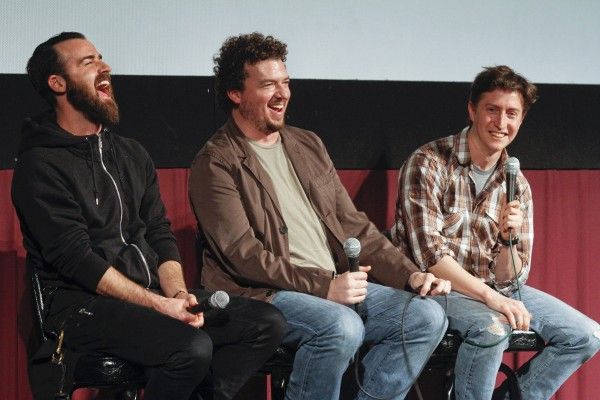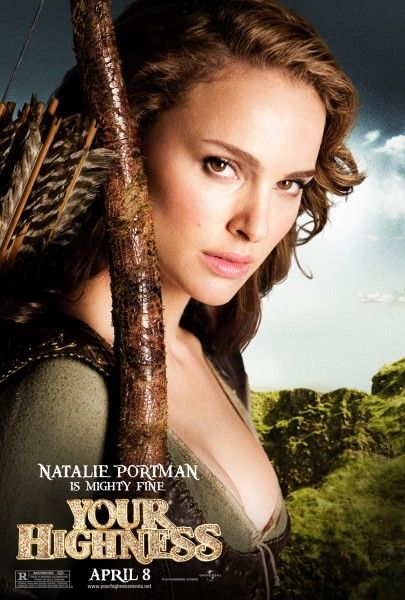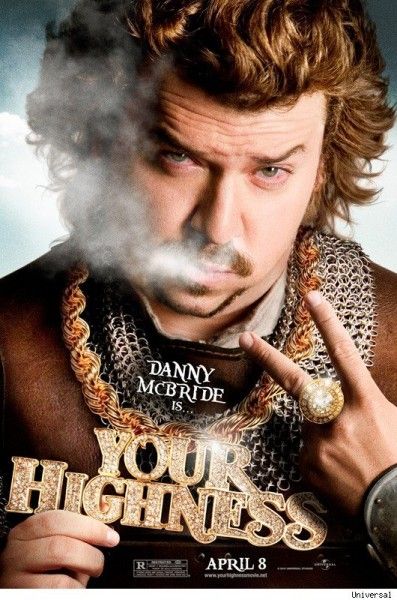The idea behind Your Highness apparently started as a joke between film school friends David Gordon Green and Danny McBride, with neither one of them thinking it would ever make it to the big screen. Now, not only is it hitting the big screen, but it’s doing so with some hilarious laughs, big effects and a stellar cast.
Your Highness is a comedy adventure set in a time when handsome knights would rescue fair damsels, slay dragons and conquer evil. While Fabious (James Franco) is off doing just that, his younger brother Thadeous (Danny McBride) has become accustomed to spending his life slacking off. But, when Fabious’ fiancee, Belladonna (Zooey Deschanel), gets kidnapped by the evil wizard Leezar (Justin Theroux), so that he can impregnate her with a dragon, Thadeous must join Fabious in his quest to rescue her. When they cross paths with the mysterious Isabel (Natalie Portman), they realize that they have quite similar goals and they team up to take down Leezar before he can fulfill an ancient prophecy.
At the film’s press day, director David Gordon Green talked about his “anything goes” approach to the film, how generous he found the MPAA in their ratings decision, scenes that will be added to the DVD/Blu-ray, and what directors have inspired him. Check out what he had to say after the jump:
Question: How did the idea for this film come about?
DAVID GORDON GREEN: I’ve never wanted to be a fireman, in my life. I’ve never really wanted to grow up and be anything other than a film director. So, it’s been an obsession of various genres, disciplines, and aspects and elements of movie-making. It’s always been something that I’ve really aspired to, so doing something new and different, reinventing myself and working with new people is just the passport to the amazing world that is the movies. So, with this particular idea, it was about 10 years ago and Danny was acting for the first time. We went to film school together and lived down the hall from each other, in the dorms. We really just admired each other’s eclectic sensibility and VHS collections. We were writing things together, making short films and working on our school projects together. We were in production on a movie called All the Real Girls, which filmed in the Fall of 2001, and we really discovered who Danny McBride was, as an actor. When I say we, I mean me and a crew and a small audience that would hit the art house. He’d never acted before, and it was a really refreshing, eye-opening experience to watch him unleash, in front of the camera, all this comedic potential that we knew he had, as a human being and as the guy doing keg-stands at the party.
When you see somebody actually be able to channel that into an accessible, beautiful tool, you start to see the craftsman behind it. So, when we were in production and we were shooting up in the mountains of North Carolina, we started playing this game that we’ve played since college, where I’d give him a title and he’d tell me what the movie was about. It literally began as a beer-drinking game, and we’d done that for years. I’d say, “The movie is called Character Witness,” and he’d say, “It’s about a guy that’s paid to lie under oath in court, and he puts on all these disguises.” He’d just come up with the dumbest, bullshit movie ideas. So, the dumbest, bullshit movie idea of all of them was when I threw out the title Your Highness, and he said, “It’s about a prince in the Middle Ages that smokes weed and fights dragons.” We’d laugh it up, and then we’d move on the next terrible idea. But, that was one that just kept coming back up. The more we started talking about, the more we thought of this movie as an opportunity.
And then, the more our profiles started to rise, and Danny started to be discovered for roles in films like The Foot Fist Way and Tropic Thunder, and we collaborated again on making Pineapple Express, people came to us and said, “What do you want to do next?” That literally was an opportunity of just looking at each other and saying, “Are you ready to get into this?” We expected them to shoot us down and say, “No way in hell, would we allow you to ever make this movie!” But, we gave them a very clear pitch. We wanted to make this movie a very commercially accessible, huge event popcorn movie that’s somewhere between Barry Lyndon and Krull. If people could wrap their heads around that, then we were ready. Fortunately, working with Universal was just a real opportunity of a supportive entity, who not only financially backed and distributed the movie, but creatively collaborated with us, and gave us ideas and creative ways to make a movie that was budgetarily responsible.
What was more of a challenge for you, getting the effects right and making it look good, or getting the guys to do what you needed them to do?
GORDON GREEN: The beauty of it being a fantasy movie and it taking place not in any specific time period or region is that I could pick and choose everything that I like from everything. So, it was an anything goes kind of movie. That was the beauty of it. The challenges of it were the logistics. In my eyes, going into the movie, I wanted it to be a huge swashbuckling adventure film that had massive visual effects, creatures, landscape and an adrenalin-fueled sword and sorcery feel, like the films that I grew up with. Having all of that, and doing all the development of that, the pre-production of that, the research of that and the education of that, the goal then became, “How do I make it funny as hell? How do I put a fresh spin on this, so that it’s not just a low-rent spoof of a Harry Potter movie or a The Lord of the Rings movie?”
I didn’t ever want to approach it satirically. I didn’t even really want any jokes in the movie. I just wanted it to be really funny, and that’s a difficult task, especially when you’re dealing with the expectations of an audience that knows what a satire is. We’ve seen a lot of wonderful Monty Python movies and hilarious Mel Brooks movies. What we really tried to do was infuse serious, great actors who knew what comedy was, but are most known for serious roles, even the supporting cast, like Charles Dance, Toby Jones and Damian Lewis, and then getting really skilled American actors, like Natalie Portman and James Franco. And then, there’s the wild card of Danny McBride who, as an actor, is just now starting to come to the surface and introduce himself to audiences. Bringing these fresh spins on a genre is really my goal.
When you have so much improvisation going on, on the set, is it a big challenge to decide what to keep and what to cut?
GORDON GREEN: There was nothing we had to cut. It was really a very smart, wonderful collaboration of people putting their heads together to think of what makes the best movie. There were no rules, really. There was nobody saying, “You can do this,” or “You can’t do this.” Even the MPAA was very generous with us, in allowing some of the things and the taboos that we’re trying to deconstruct a little bit. We do a lot of riffing on set. We always film what we’ve scripted, and then we get the wild versions of it. We do several takes, sometimes. We’ll go, “How can we put a spin on this, that we never imagined?” While we’re filming, we get the dramatic version and the funny version. Sometimes we go a little too far, and then we pull it back. We really want to have all those options in the editing room.
Are there any scenes that you’ll be adding to the DVD/Blu-ray?
GORDON GREEN: We did one sequence that was a musical sequence between Zooey Deschanel’s character Belladonna, up in the tower, and James Franco’s character Fabious, on the quest. They were singing a duet, far apart. We shot that, and it’s beautiful and really funny. It’s an homage to an old Kenny Loggins, ‘80s movie song, but when we put it in the movie, it started to break the rules that we’d established and it felt a little bit like a Saturday Night Live skit. It’s tremendous on its own. It’s hilarious, it’s beautiful and it’s very interesting. It actually drives the narrative, in its own peculiar way, but when we put it in the movie, we were like, “You know what? We should take that out of the movie because it does start to lean a little bit far towards satire,” as opposed to what we’d set up as a genuine adventure movie. There’s also an amazing behind-the-scenes documentary. There’s a ton of crazy stuff, including additional scenes. This is the first movie I’ve done that I feel like needs an extended version, just so that we can get really excessive. There’s a lot of fun stuff.
How did the production differ between this and Pineapple Express?
GORDON GREEN: The difference between this film and Pineapple Express was pretty much in the logistics of the technical ambition of the movie, and the size and scope of the movie. Pineapple Express was a great success, and that was something that we wanted to capitalize on, but we wanted this movie to be bigger, more adventuresome, bring a bigger audience to the movie, and challenge ourselves to do something new, like having the giant carriage chase, or taking the time to get all the specific elements to create some of these computer generated characters. There was a lot to keep in mind, on top of what’s in the foreground. At the end of the day, we wanted two characters look into each other’s eyes and make each other laugh. That’s going to be contagious and make an audience laugh. So, there was a lot to inject into it, more so than any film I’d ever done before, but that just meant a big prep time and a supportive group of technicians that helped educate me about a world that I never dreamed I’d have the opportunity to explore.
Was there anything that you thought was too far out there for the film?
GORDON GREEN: There was one draft of the script where we were exploring the idea of having the climax of the movie be an orgy, but for a number of reasons, we decided that was not a good idea. Ultimately, it would have been distracting from the face-to-face good vs. evil quest of it. It would be distracting, if there were just hot, naked people, all over the place. That would have also been logistic-heavy. We would have needed a few extra days to shoot that. Maybe we’ll have an Ewok-style orgy in the sequel.
Did the MPAA have any issues about how much you could show the Minotaur penis and how long it could be dangling around Danny’s neck?
GORDON GREEN: Luckily, the MPAA was laughing so hard that they even lost count of the number of times we said the word “fuck” in this movie. There was really no problem with it. Part of the charm of this movie is that it can go to evil places within the narrative of the movie, but it’s so light-hearted and such a swash-buckling romp that nobody really takes it too seriously. We didn’t really have any head-butting there. Creatively, we were able to get away with a lot. You have to push the envelope in what comedy has explored before. They never gave me a slap on the wrist. I’ll probably get in trouble when my mom watches the movie, but that’s probably as much punishment as I’ll reap for this movie.
What directors inspire you?
GORDON GREEN: A lot of people inspire me. I’m a huge movie buff. From studying and watching movies, over and over again, directly influential are Terrence Malik and his naturalism, Robert Altman and his exploration of improvisation, and Judd Apatow, in terms of his comedic process. Hanging out on the set of Knocked Up was a real education to me. I saw how you could get away with such a free-spirited, naturalistic sensibility in a mainstream Hollywood movie, and you could apply a lot of the skills of the ‘70s icons that I really admire to a contemporary, commercial movie.



